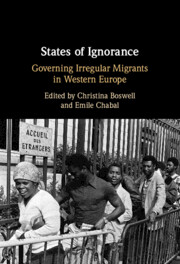Book contents
- States of Ignorance
- States of Ignorance
- Copyright page
- Contents
- About the Editors and Contributors
- Acknowledgements
- Introduction
- 1 States, Knowledge and Ignorance
- 2 The Post-war European State and (Irregular) Migration
- 3 The Invention of Illegal Immigration
- 4 (Im)perfect Control
- 5 From Ignorance to Illegalisation
- 6 Denial, Elucidation or Resignation? British and German State Responses to Unauthorised Migrants
- 7 To See or Not to See
- 8 European Integration and the Leap into the Unknown
- 9 Control Infrastructures and Ignorance
- Index
- References
9 - Control Infrastructures and Ignorance
Published online by Cambridge University Press: 02 November 2023
- States of Ignorance
- States of Ignorance
- Copyright page
- Contents
- About the Editors and Contributors
- Acknowledgements
- Introduction
- 1 States, Knowledge and Ignorance
- 2 The Post-war European State and (Irregular) Migration
- 3 The Invention of Illegal Immigration
- 4 (Im)perfect Control
- 5 From Ignorance to Illegalisation
- 6 Denial, Elucidation or Resignation? British and German State Responses to Unauthorised Migrants
- 7 To See or Not to See
- 8 European Integration and the Leap into the Unknown
- 9 Control Infrastructures and Ignorance
- Index
- References
Summary
In our concluding chapter, we review the evolution of state infrastructures of control. Such infrastructures embody state beliefs about how best to steer migrants, and also provide maps with which states ‘see’ their unauthorised populations. We chart changes in infrastructures since the 1960s across three dimensions: styles, sites and temporalities of control. The analysis highlights the continued reliance on centralised command and control approaches in Germany, despite niggling concerns that they are not capturing the full picture. In France, patchy implementation of work and welfare restrictions, and a sharp left-right divide on the issue, has repeatedly led governments back to the tool of regularisation. In the UK, lack of internal control infrastructure has been compensated for by outsourcing to external organisations, meaning that migrants get ‘caught’ at later stages in their lives when they are most reliant on social and economic support. We explore the implications of these different infrastructures on state knowledge and ignorance.
- Type
- Chapter
- Information
- States of IgnoranceGoverning Irregular Migrants in Western Europe, pp. 243 - 272Publisher: Cambridge University PressPrint publication year: 2023

